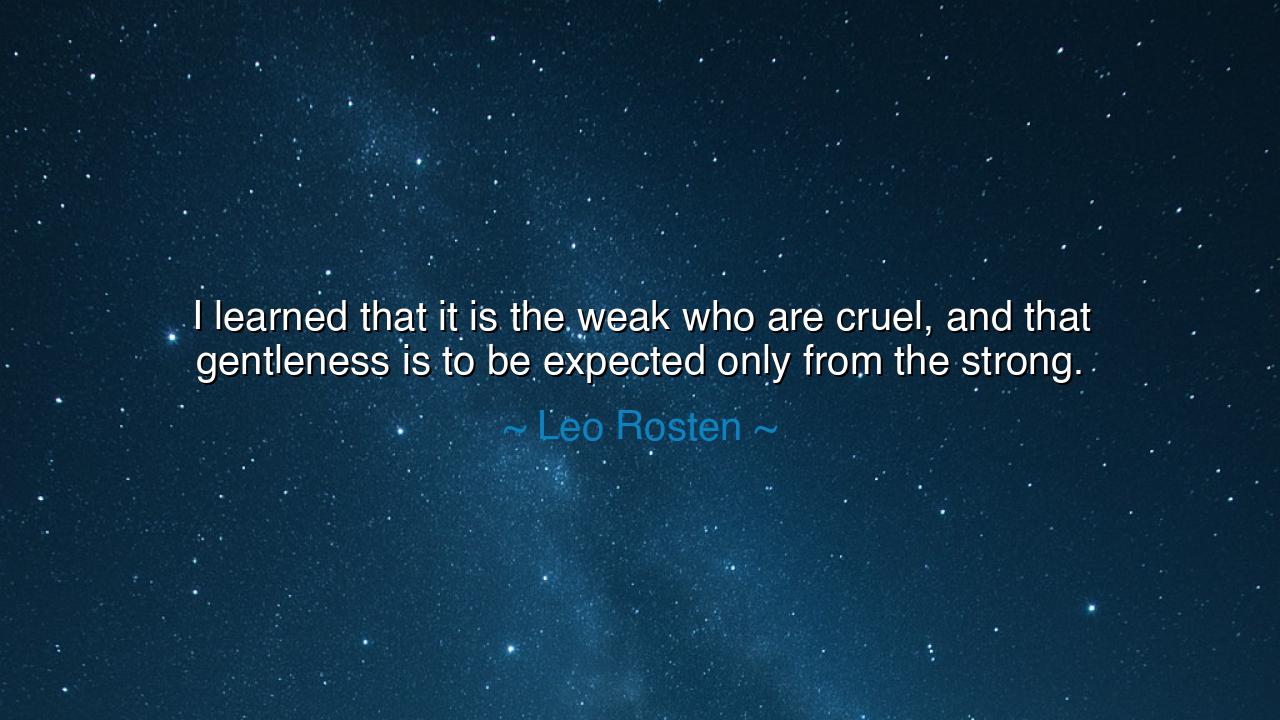
I learned that it is the weak who are cruel, and that gentleness
I learned that it is the weak who are cruel, and that gentleness is to be expected only from the strong.






Leo Rosten declared: “I learned that it is the weak who are cruel, and that gentleness is to be expected only from the strong.” These words shine like a blade of truth, cutting through the illusions of power and fear. Many believe that cruelty is strength—that the harsh voice, the iron fist, the merciless ruler are signs of greatness. Yet Rosten reminds us of the deeper law: cruelty is born not of power, but of weakness. True strength has no need to harm, for it rests secure in itself; it is the uncertain, the insecure, the fragile spirit that lashes out with cruelty.
The ancients knew this well. A mighty oak does not fear the passing wind, but a withered reed bends and strikes when pressed. Likewise, the lion does not roar at every creature; it is the frightened beast that snarls at shadows. To be gentle is not to be frail, but to wield power with restraint, to hold dominion over one’s anger, to master the self before seeking to master others. Thus, the path of true strength is marked not by cruelty, but by compassion.
Consider the life of Mahatma Gandhi. He was a man without armies, without wealth, without weapons. The British Empire, vast and unyielding, towered over him like a colossus. Yet Gandhi, with quiet voice and steadfast heart, chose the way of gentleness. His strength was not in swords, but in his unbreakable spirit. And through nonviolence, he shook an empire, teaching the world that true power is not the ability to destroy, but the courage to endure and to forgive. Cruelty could never have achieved what his gentleness brought forth.
Contrast this with the tyrants of history—men like Nero, who bathed in cruelty, or Stalin, whose reign was built on fear. Their cruelty was the mask of weakness, the cloak of insecurity. For they knew their hold was brittle, and so they sought to break others to disguise their own fragility. Their names are remembered with dread, but not with honor. They remind us that cruelty is the weapon of those too weak to inspire loyalty and too fearful to inspire love.
The lesson is clear: cruelty is never strength, it is decay. It consumes the wielder even as it wounds the victim. Gentleness, on the other hand, is the mark of one who has mastered themselves, who fears nothing, who has no need to prove their power through harm. The strong can afford to be kind, for kindness does not lessen their might—it magnifies it.
Therefore, let each soul strive to cultivate this deeper strength. When anger rises, learn restraint. When others falter, offer patience. When those weaker than you cross your path, treat them with dignity, for it is easy to crush, but divine to uplift. Let your strength be tested not in how fiercely you strike, but in how gently you can hold.
In practice, begin with small acts: speak softly when provoked, listen deeply when dismissed, show mercy when you have the power to condemn. Remember that every moment of restraint is a victory over the self, and every act of gentleness is a monument to true strength. In time, your life itself will bear witness to Rosten’s wisdom: the weak are cruel, but the strong shine in gentleness, and it is they who shape the world for generations to come.






AAdministratorAdministrator
Welcome, honored guests. Please leave a comment, we will respond soon